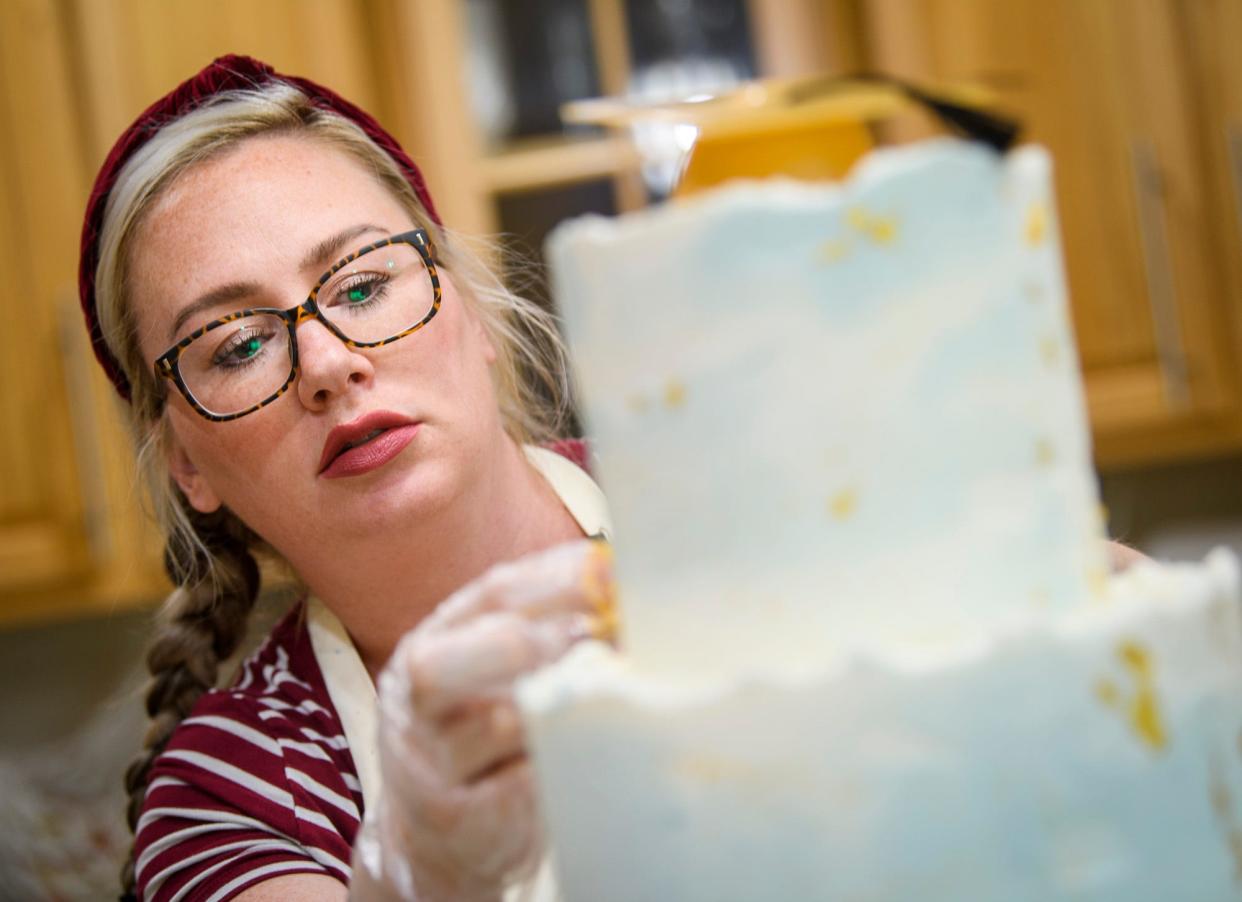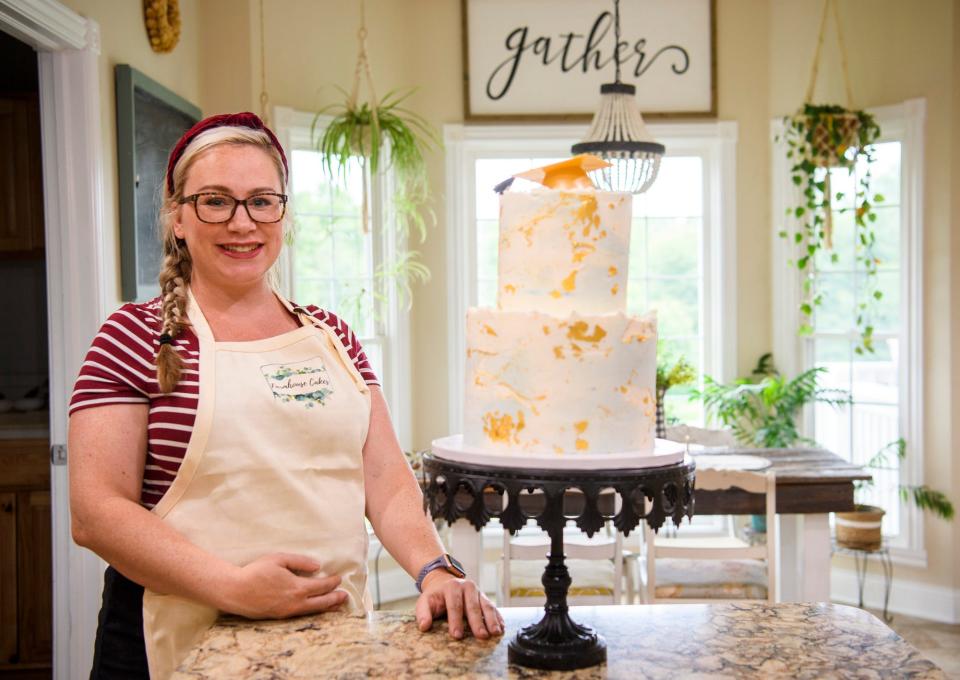'From my kitchen to your home': Changes are coming to Indiana cottage food laws

Carrie Garner, owner and sole baker at Büké, operates her bakery from home. She wants her customers to feel as though they baked the treats themselves for their friends or family, fresh from their oven.
“I have a slogan,” she said. “It’s ‘I’m bringing the goodness from my kitchen to your home.’”
What is cottage food?
“Cottage food” is made in home kitchens for sale, according to the Institute for Justice. In Indiana, home cooks and bakers can sell non-hazardous food that does not need to be refrigerated. Examples include baked goods like cookies and cakes.
Home-based vendors can use their domestic kitchens to make items to sell at farmer's markets and roadside stands. Local health departments inspect commercial kitchens to make sure it adheres to wholesale or retail food code, according to in.gov.
More: Which homemade foods can you sell in Indiana? Here's what the 'cottage food' laws say
New legislation on July 1 will allow home-based vendors to deliver sealed food, untampered with and sold for retail, according to Ashley Bergquist, environmental health services manager at the Monroe County Health Department.
A love of baking
Garner’s husband inspired her to start her business three years ago.
“I had been baking for several years, and my husband kept saying, ‘You can't keep giving food out for free’” she said. “I just like to give people food, because I love to bake.”
Garner typically sells cookies, cupcakes and breads. But if someone wants to order a food she’s never made before, she’ll try because she doesn’t mind trying new things.
It was tricky , Garner said, figuring out the rules for selling food from home. Some of her favorite things to make, such as stromboli, Garner can’t sell because of the cooked meat inside. She said it’s sometimes frustrating to not be able to offer customers fruit pies, cream cheese frosting or ice cream cakes.
“If they just figured out a way to educate, communicate and then regulate and have training classes that are required, I think we would be able to sell more things,” she said.
Büké is at its busiest during major holidays, Garner said, but she typically has five to seven orders per week. She gets most of her business from Facebook and word of mouth.
It can be difficult to operate her business at home with her children around, she said, but it’s a balancing act. This year she decided not to take orders for graduation as her daughter was graduating from Bloomington High School South and she wanted to focus on her instead.
On the Menu: Trailhead Pizzeria making its way back; Function Brewing changes its name
“It’s a blessing and a curse because I make it work around things,” she said.
Garner decided to make her business a LLC, or limited liability company, to protect herself. But home-based vendors aren’t required to do so. Additionally, she contacts the Monroe County Health Department with specific questions to avoid any problems.
For now, Garner said she doesn’t plan to expand.
“It's just my outlet for my creativity,” she said. “I want to give them the best product that I can. So I just want to do it myself.”
Regulating the cottage food industry
Until July 1, home-based vendors can only sell their products at farmers' markets and roadside stands, Nicole Wagner, environmental health specialist for the food division at Monroe County Health Department, said. Products must be non-potentially hazardous, meaning they can only require refrigeration for quality, not necessity. Uncut fruit can be sold, but once it’s cut, there’s an opportunity for bacterial growth.
“It compromises, basically, the integrity of that product,” she said.
Vintage clothes, unique gifts: Here's what's new in downtown Bloomington
People selling food within the guidelines are not regulated by the health department, Wagner said, but they will do random spot checks at farmers' markets.
Farmhouse Cakes just one of woman's home businesses
Alison Ballman, owner and sole cake artist at Farmhouse Cakes, operates a bakery out of her home. She was inspired by her daughters to start the business in 2018 after learning how to make cakes for their birthday parties.

Ballman makes all kinds of cakes including wedding cakes, cookie cakes, cupcakes and cake pops. She also makes edible cookie dough and macaroons. She’s busiest during the fall, when there’s typically three or four weddings per weekend, she said.
It’s hard to keep up with the demand by herself, Ballman said, with about 10 orders per week. But she, like Garner, loves having an artistic, creative outlet.
“I love the freedom to just create,” she said. “It’s just really fun for me to make cakes that are customized to each customer. I try not to make one cake the same as the next.”
Ballman also sells flowers and hopes to soon sell vegetables at her Farmhouse Flower Stand, another home business.
Customers order through Ballman’s website, farmhousecakesin.com, on social media and over the phone, she said. Orders are picked up at a stand on the porch of her house. When the new law goes into effect July 1, she said she plans to start deliveries in her SUV because it will be more convenient and might open up additional business for those who can't pick up their orders.

Farmhouse Cakes will likely stay an at-home business, Ballman said, because she loves the business as it is and hopes to have her 3- and 5-year-old daughters help with baking and decorating as they get older.
“It’s fulfilling everything that I have dreamed of,” she said.
Reach Luzane Draughon at ldraughon@gannett.com or @luzdraughon on Twitter.
This article originally appeared on The Herald-Times: Cottage food vendors in Indiana will require certification July 1
